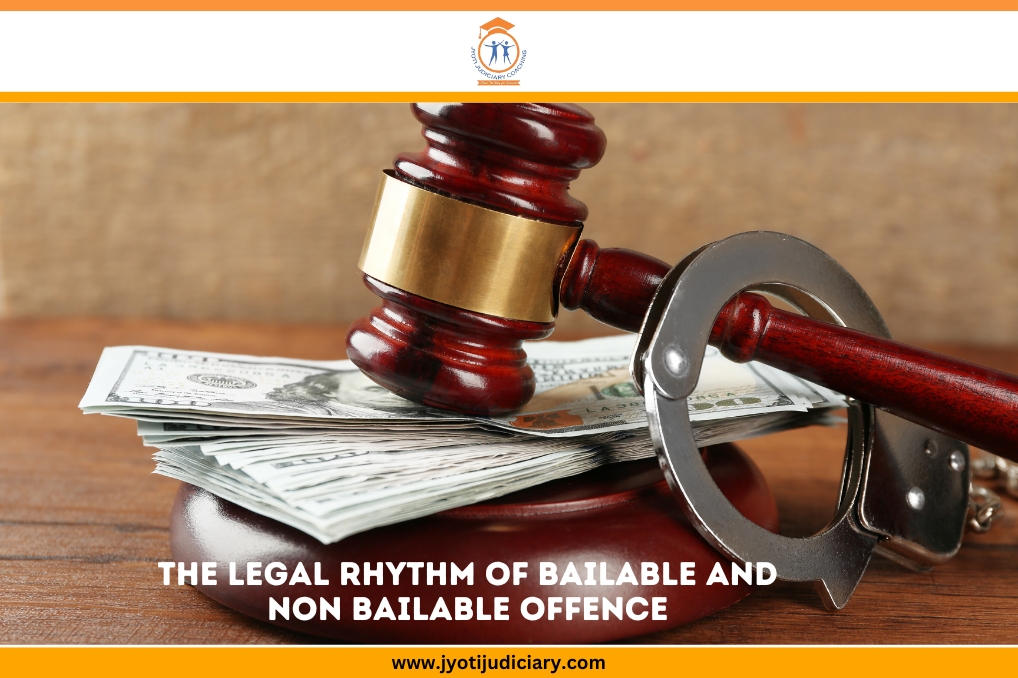
In legal terms, “bail” is the process of securing someone’s release from custody while they await trial or an appeal by paying a bond that guarantees his quick turn-in to the authorities.
It is a post-arrest remedy that allows the arrested person to be freed pending his trial. The traditional right to liberty is safeguarded by bail until guilt is established. Bail is allowed to give an accused person time to prepare a defense to the charges against him based on the common law presumption of innocence and to avoid innocent people being jailed, which would be a pre-trial penalty. Laws govern the right to bail, and the law governing bail is an essential part of the criminal justice system.
What is a Bailable Offence?
- When a person is charged with a crime and granted bail, they must provide a bail bond. This is known as a qualifying bailable offences. However, granting bail does not free the accused. He or she needs to follow the legal process.
- Bailable offence examples: minor thefts, violations of traffic laws, simple assault, and so forth.
What are Non Bailable Offences?
- Criminal acts that are not subject to bail can have their bail rejected by the court without requiring a hearing on the matter for a predetermined period of time is known as non bailable offences. The defendants will be held in judicial custody until their trial. Nonetheless, the court may choose to grant the accused bail in light of the circumstances and the evidence presented.
- non bailable offence examples: terrorism, drug trafficking, rape, murder, etc.
Is Section 498a IPC Bailable or Not?
- The offense specified in Section 498A of the IPC is not subject to bail. Section 498a not bailable.
- The police officer is required to compulsorily record the First Information Report (FIR) filed by the complainant under Section 498A of the IPC. It is the officer’s responsibility to initiate an investigation and make any necessary arrests in connection with the case.
bailable and non bailable offence: Differences
The differences between bailable and non bailable offence are as follows:
| Bailable Offense | Non- Bailable Offense |
| This is the kind of offense for which bail can be given both at the time of the arrest and during the proceedings in court. | This type of charge prohibits the granting of bail at the time of arrest. The accused must ask the court for bail. |
| The police officer has the power to set bail in cases of bailable offenses. | The court of law has the power to set bail for offenses that are not eligible for bail. |
| The offense is of a small and less serious kind. | The offense is typically more severe and horrific in character. |
| Crimes that are subject to bail are accompanied by less harsh penalties and punishments. | Crimes that are not subject to bail usually carry heavier sentences and fines. |
| When it comes to cases where bail is an option, police officers can make an arrest without obtaining a warrant. | For crimes where bail is not an option, police officers must get a warrant before they can make an arrest. |
| For offenses that have been made subject to bail, the accused may be released on bond without having to appear in court. | For offenses for which bail is not available, the accused must appear in court and make their bail request in front of the judge. |
| The court has the power to grant or refuse bail for crimes for which one can be held accountable. | The court may refuse to issue bail for non-bailable charges depending on the seriousness of the offense in question, but it must give good cause. |
| Largely first-time offenders or minor disputes; are seen as less serious violations. | Regarded as high-profile, terrible crimes because they have the potential to seriously affect the public’s safety or result in dire consequences. |
The ways in which certain offenses qualify for bail as well as others do not have a significant effect on the legal system and the rights of the accused. This right is typically restricted by non-bailable offenses unless there are special conditions, while bailable offenses allow the request of bail. Those facing various criminal accusations must understand these distinctions in order to navigate the complex workings of the legal system. By doing this, they are able to successfully exercise their rights and work toward a just and reasonable conclusion.
Bailable and Non Bailable Offence FAQs
Under what circumstances bail can be granted in non bailable offence?
If a person accused of any non-bailable offense in a case that a magistrate can try is not found guilty after sixty days from the first date that the case’s evidence was taken, the person will, if he is in custody for the entirety of that time, be released on bail to the contentment of the magistrate, unless the magistrate orders otherwise for reasons that must be documented in writing.
Can a bailable offence lead to conviction?
During the course of the case, the accused in an offence covered by Section 474 IPC is free on bond. The Chief Judge finds him guilty and sentences him to five years in jail.
What happens in bailable offence?
Crimes or offenses that are not extremely serious in nature are those that are subject to bail. In certain situations, posting bond with the police is a requirement for the accused person to be released. It is within the police’s power to impose bail in these kinds of cases.
When can bail be Cancelled?
If it becomes out that the person who was given bail has broken any of the terms or abused their freedom by influencing witnesses or interfering with evidence, the bail amount already granted may be revoked.
Can police grant bail in non-bailable offence?
When an offence is not subject to bail, the police do not provide bail. Only a Judicial Magistrate or Judge may make the decision.
What is the maximum punishment in bailable offence?
Bailable offenses are comparatively less serious offenses that carry a maximum sentence of three years in jail or a fine alone.
Why is bail important?
Bail is primarily used to ensure that the offender shows up for court. However, relying only on a cash bail system has brought about a number of issues for the community, courts, and offenders.
Is robbery a bailable offence?
The maximum sentence for a robbery that takes place on a highway between dusk and dawn is fourteen years. In response to the query of whether or not robbery is subject to bail under Section 392 IPC, the answer is negative.
Is bail possible in 307?
As a non-bailable offence under Section 307 IPC, the magistrate has the authority to refuse bail.
What happens in a non-bailable offence?
In cases where bail is not required, the accused is required to stay in detention until the court issues an order.
Why does bail require money?
Bail should only be imposed in situations when the court determines that asking someone to make a financial commitment on their behalf or to guarantee payment in the event that the defendant fails to appear in court is the only practical means of ensuring their appearance.
Why do courts give bail?
When specific requirements established by the court are fulfilled, bail allows a person who is awaiting trial to be temporarily released. You are not required to stay in a cell until your court date if you are arrested. You may be released from custody temporarily if you are able to post a bail bond and the judge determines you pose no risk.
With the goal of giving students the best coaching available for law entrance exams including the CLAT, AILET, and various other numerous state judiciary exams, Jyoti Judiciary Coaching, India’s Finest educational Platform, was established. Come enroll now with Jyoti Judiciary!
For any latest news, legal topics, judiciary exams notifications, patterns, etc watch Jyoti Judiciary’s YouTube channel for legal videos for any updates at https://youtube.com/@jyotijudiciarycoaching4852?si=2cwubh9d2A9urwJf









